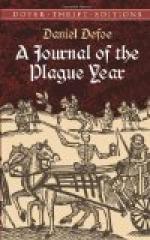There were indeed several little hurries which happened after the decrease of the plague, and which, whether they were contrived to fright and disorder the people, as some imagined, I cannot say; but sometimes we were told the plague would return by such a time; and the famous Solomon Eagle, the naked Quaker I have mentioned, prophesied evil tidings every day, and several others, telling us that London had not been sufficiently scourged, and the sorer and severer strokes were yet behind. Had they stopped there, or had they descended to particulars, and told us that the city should be the next year destroyed by fire, then, indeed, when we had seen it come to pass, we should not have been to blame to have paid more than common respect to their prophetic spirits (at least, we should have wondered at them, and have been more serious in our inquiries after the meaning of it, and whence they had the foreknowledge); but as they generally told us of a relapse into the plague, we have had no concern since that about them. Yet by those frequent clamors we were all kept with some kind of apprehensions constantly upon us; and if any died suddenly, or if the spotted fevers at any time increased, we were presently alarmed; much more if the number of the plague increased, for to the end of the year there were always between two and three hundred[342] of the plague. On any of these occasions, I say, we were alarmed anew.
Those who remember the city of London before the fire must remember that there was then no such place as that we now call Newgate Market; but in the middle of the street, which is now called Blow Bladder Street, and which had its name from the butchers, who used to kill and dress their sheep there (and who, it seems, had a custom to blow up their meat with pipes, to make it look thicker and fatter than it was, and were punished there for it by the lord mayor),—I say, from the end of the street towards Newgate there stood two long rows of shambles for the selling[343] meat.
It was in those shambles that two persons falling down dead as they were buying meat, gave rise to a rumor that the meat was all infected; which though it might affright the people, and spoiled the market for two or three days, yet it appeared plainly afterwards that there was nothing of truth in the suggestion: but nobody can account for the possession of fear when it takes hold of the mind. However, it pleased God, by the continuing of the winter weather, so to restore the health of the city, that by February following we reckoned the distemper quite ceased, and then we were not easily frighted again.




